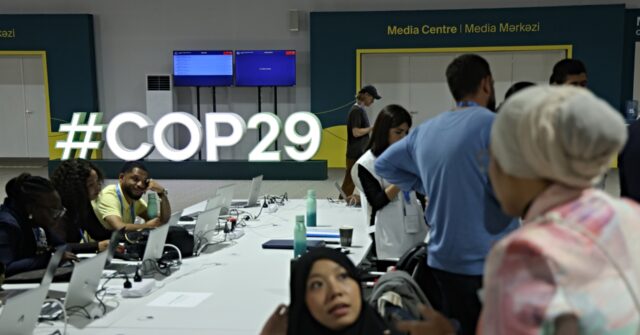The 29th annual United Nations climate conference (COP29) is taking place in Baku, Azerbaijan, drawing upwards of 50,000 participants, amid significant discussions around limiting carbon emissions and the contentious issue of financial compensation from developed nations to poorer countries. This year’s agenda is marked by a dual focus: reducing global emissions and establishing a framework for wealth transfers to assist nations that are disproportionately affected by the climate crisis, despite their minimal contributions to its causes. High-profile climate activist Greta Thunberg, however, has opted not to participate, critiquing the event as an example of “greenwashing” led by a host country—Azerbaijan—that she claims shows little ambition for meaningful climate action.
The focal point of COP29 is an ambitious goal that seeks to secure up to $1 trillion annually in climate finance targeted toward developing nations, a substantial increase from the prior goal of $100 billion. This increased financial commitment is seen as essential for enabling poorer countries to cope with the severe environmental impacts of climate change, including intensified heatwaves, flooding, and storms. Fundamental to the discussions is the notion that wealthy nations, which have historically profited from fossil fuel consumption, owe a “debt” to these countries as a form of climate reparations. The call for reparations emphasizes that the historical exploitation of resources has led to current disparities in development and climate vulnerability.
Tasneem Essop, executive director of Climate Action Network, highlighted the urgency of this conversation during the conference, asserting that a dowry of $5 trillion in annual support is what developing nations are advocating for. The framing of this financial demand as a “down payment” on a much larger debt reflects a growing recognition of the systemic inequalities that underpin climate change and suggests the necessity for an ongoing commitment from wealthier states. This paradigm shift asserts that those who have contributed the most to greenhouse gas emissions have a moral obligation to substantively support affected nations, facilitating a transition away from fossil fuels and toward sustainable development practices.
The atmosphere surrounding COP29 is further complicated by political changes, particularly the anticipated return of Donald Trump to the White House, who has historically expressed skepticism about climate initiatives and plans to withdraw from the Paris Agreement. This potential shift in U.S. policy raises concerns among global participants about the continuity of international climate commitments and the robustness of multilateral cooperation. The presence of Trump could serve as a rallying point for those resistant to climate action, reinforcing divides between nations based on their economic capacities and responsibilities.
Simon Stiell, the U.N. climate chief, emphasized the critical juncture at which the climate talks are taking place, urging that global cooperation is essential to tackle the climate crisis and should not be misconstrued as mere benevolence from wealthier nations. He argued that climate financing must be viewed as a necessary investment for all countries, asserting that it lies in the self-interest of even the wealthiest nations to support resilient development in vulnerable regions. This perspective seeks to reshape the discourse around climate finance, moving away from the narrative of charity to one of mutual benefit and responsibility.
With discussions expected to continue through November 22, COP29 represents not only a platform for addressing urgent environmental imperatives but also an arena for examining the ethical dimensions of global climate policy. The stakes are high, as nations negotiate their paths forward in a world increasingly defined by climate challenges. The reception of COP29’s outcomes could significantly influence the global climate agenda and the relationship between affluent and developing nations as they seek to collaborate in combating one of humanity’s most pressing crises.

